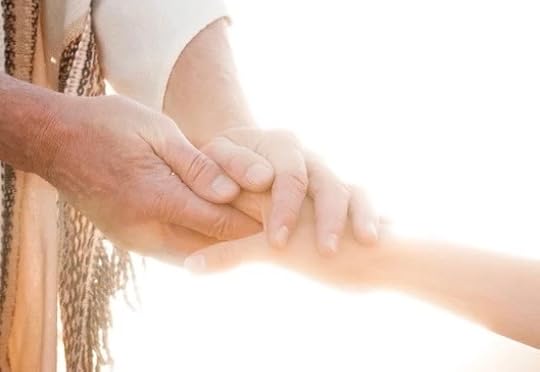Sarah Christmyer's Blog, page 13
May 19, 2019
STOP KEEPING SCORE! True love is not 50-50
“Everything is 50-50 in our marriage,” a friend told me. “That’s why it works.”
I cringed, not knowing how to respond. Clearly she was proud of the way she and her husband shared things equally, down to the daily chores. But 50-50 isn’t just equal; it’s divisive. By which I mean you have to divide to reach it. Your eyes are always on the end point because if you go beyond 50, you might be taken advantage of.
 Fifty-fifty requires a score card and frequent checks and balances. In order to score yourself, you have to score the other person too—which is often what it whittles down to. You didn’t put in your 50 this week, so why should I? That might work in a partnership, but in a marriage? In a friendship? I don’t think so. You can’t be forever keeping score and withholding 50% and expect a relationship to grow.
Fifty-fifty requires a score card and frequent checks and balances. In order to score yourself, you have to score the other person too—which is often what it whittles down to. You didn’t put in your 50 this week, so why should I? That might work in a partnership, but in a marriage? In a friendship? I don’t think so. You can’t be forever keeping score and withholding 50% and expect a relationship to grow.
Jesus is all about giving 100%, and he expects (and equips!) us to do the same.
I give you a new commandment: love one another.
As I have loved you, so you also should love one another.
This is how all will know that you are my disciples,
if you have love for one another. (John 13:34-35)
+ + + + + + + + + +
Read the full Gospel reading here
+ + + + + + + + + +
“As I have loved you” is the key. Jesus gave everything at the ultimate cost of his life to people who didn’t deserve or expect it. Now he lives in us so we can do the same.
The love Jesus taught and gave is not a matching gift. It’s all about giving more, and what it gives is life and joy. Fortunately for us, that kind of love doesn’t have to start with the costliest gift. A habit of love starts in the everyday giving:
Love gives more than expected — bringing flowers on gray day, or finishing the laundry you only promised to start.
Love gives more than is convenient — setting your own work aside to deliver a forgotten briefcase
Love gives more than is comfortable — offering money saved for your rainy day, to help someone else through theirs.
Love gives more than can be returned. It gives “just because.”

If you want to love like Jesus loved, start by throwing away the score card. Love is not giving 50 when you get 50. It’s giving 100% … and then giving more.
Isn’t that risky? Sure. After all, the other person might stick with 50, or worse — they might let you do it all.
And yes, there are times when giving crosses into enabling. But I’ve seen how giving 100 to someone else can prompt love in return. And I’ve experienced the draw of love, when someone gave me everything, no strings attached. But I have never seen withholding 50 do the same.
Let’s throw away the score cards. “Loving must be as normal to us as living and breathing, day after day until our death,” wrote Saint Teresa of Calcutta. “Love does not measure; it just gives.”

Amen to that.
This quote is part of a reflection gathered in “Jesus, the Word to be Spoken: Prayers and Meditations for every Day of the Year.” It was quoted today in Magnificat magazine in conjunction to today’s gospel, John 13:31-33a, 34-35.
© 2019 Sarah Christmyer
Pre-order today from Ave Maria Press, Amazon, or Barnes & Noble.
The post STOP KEEPING SCORE! True love is not 50-50 appeared first on Come Into The Word with Sarah Christmyer | Bible Study | Lectio Divina | Journals | Retreat.
May 14, 2019
YOU’VE BEEN CHOSEN . . . NOW WHAT?
I’ve been thinking of Matthias this week, Matthias who was chosen in Acts 1 to replace Judas as the twelfth apostle.
When someone’s a traitor to the cause, then kills himself, the matter of filling that spot is a sober one. Imagine today, being part of a movement and one of your own puts out a hit on the leader . . . who miraculously returns to life, but that doesn’t for a minute undo the evil of the kiss that got him killed to begin with. Seeing the traitor’s empty chair in the board room would bring that all to mind; in the case of Judas, everything from the night in the garden to the nights Jesus spent in the tomb. Now Jesus has ascended to Heaven. Peter and the others are gearing up for the biggest mission of their life and this task remains: to fill that seat before they move on.
Why Matthias?
Luke seems to give a blow-by-blow account in Acts 1 of how they chose a replacement. I’m surprised by what is not included. Any indignation or horror at the act is covered by a comment in parentheses that Judas reaped the reward of his wickedness—as though to note the fact but to set it aside as a distraction to the business at hand. And no one adds to Peter’s outline of qualifications, “make sure he’s faithful! We don’t want a repeat of last time.” Is that assumed? Or is it too much to presume on the future actions of anyone? There’s that whole thing Jesus talked about, about weeds and wheat growing together in the kingdom of God until the angels sort them out at the end. It’s not for us to judge, in the meantime.

“Casting lots,” the way God’s choice of Matthais was learned, was not unlike throwing dice. (Photo from Pixabay by fotografierende)
Anyway, we don’t get much background on Matthias. He and his fellow nominee met the necessary requirements: they were with Jesus from the beginning, from his baptism by John to his ascension. Presumably there were others too, but only one person can sit in that chair to give official witness with the other Apostles to Jesus’s resurrection. Two names were put forward and Matthias was chosen by lot. The decision is guided by the Lord, who “knows the hearts of all men.” Like he knew the heart of Judas, I might add, when Jesus chose him to begin with. It’s hard to understand the “whys” of God.
So did Matthias “restore” the chair that Judas fouled? We can’t say for sure either way. Various traditions, all at odds as to details like place and manner and date, have him spreading the gospel and dying a martyr. Presumably someone would have noted the fact if he had betrayed the Lord or disgraced his calling. But the only thing we know for sure is that he was chosen.
We too have been chosen
Of how many of us, is this same thing true? We may not be chosen to apostolic office, but we have been chosen by the Lord to bear fruit (John 15:9-17). And we are chosen in him, according to God’s purpose, “so that we might exist for the praise of his glory” (Ephesians 1:11-12). Not for the praise of our glory, but for his.
We are chosen, even though many of us have done nothing (like Matthias) worth writing about. We don’t attract followers on Instagram or twitter, a google search turns up nothing of note. And we may never do anything worth writing about. That’s not why we are chosen.
The most you can say of most of us (like Matthias) is that we were there. Somehow, in our lives, Jesus has made an appearance. We’ve heard his voice and followed him. We know he’s alive because we’ve shared in that life.
We are chosen and called to bear witness. Will we be faithful? The jury is out, although God surely knows. The outcome is up to us.
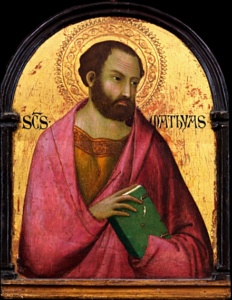
Saint Matthias, from the workshop of Simone Martini (Wikipedia)
+ + + + + + +
On this the feast day of St. Matthias, we might ask for his intercession:
For all who are chosen to bear witness to Jesus and the resurrection life that we have in his name
—that we might do so clearly and faithfully, to the praise of God’s glory.
Amen.
© 2019 Sarah Christmyer

Available for pre-order now from Ave Maria Press, Amazon, and Barnes & Noble.
The post YOU’VE BEEN CHOSEN . . . NOW WHAT? appeared first on Come Into The Word with Sarah Christmyer | Bible Study | Lectio Divina | Journals | Retreat.
May 12, 2019
A MOTHER’S DAY GREETING FROM ST. PAUL
Reading the end of St. Paul’s letter to the Romans, the part where he lists everyone he wants to greet, I was struck by verse 13: “Greet Rufus, chosen in the Lord, and his mother and mine” (NABRE). Is that one woman or two? The English Standard Version, while not as literal, gets across what most commentators think he meant:
“Greet Rufus, chosen in the Lord; also his mother, who has been a mother to me as well.”
 We don’t know much about Paul’s private life and I love this tiny insight. A woman who now lived in Rome, 700 miles away from where he was wintering in Corinth, was dear enough to him to be remembered as “mother” when he wrote. His own mother, if she was alive and still living in Tarsus, would have been 1200 miles in the other direction. Perhaps in his travels, this family of Rufus took him in. Maybe the mother had tended his wounds, fed him when he was hungry, provided a safe haven on the road. Maybe they spoke together of Jesus around the dinner table. Maybe she encouraged Paul in his work.
We don’t know much about Paul’s private life and I love this tiny insight. A woman who now lived in Rome, 700 miles away from where he was wintering in Corinth, was dear enough to him to be remembered as “mother” when he wrote. His own mother, if she was alive and still living in Tarsus, would have been 1200 miles in the other direction. Perhaps in his travels, this family of Rufus took him in. Maybe the mother had tended his wounds, fed him when he was hungry, provided a safe haven on the road. Maybe they spoke together of Jesus around the dinner table. Maybe she encouraged Paul in his work.
In praise of mothering
It’s all conjecture, but what else could it be? Because that’s what mothers do. Whether they are biological or adoptive or spiritual mothers, women care for people, they take care of them, they challenge and encourage them to be their best. There’s a reason for the cliché that dying soldiers often call their mothers with their last breath. Mothers do more than give us life. They help us live it well and they are always there for us.
Here’s something else from St. Paul that shows he knows well the spiritual value of motherhood. He wrote it to his protégé Timothy from prison shortly before his death:
“I am reminded of your sincere faith, a faith that dwelt first in your grandmother Lo′is and your mother Eunice and now, I am sure, dwells in you. […] But as for you, continue in what you have learned and have firmly believed, knowing from whom you learned it and how from childhood you have been acquainted with the sacred writings which are able to instruct you for salvation through faith in Christ Jesus” (2 Tm 1:5, 3:14, RSVCE).
Mothers share their faith
From my own childhood, I have been acquainted with Scripture that I learned “at my Mother’s knee,” as they say, and she learned the same from her mother before her. Like Timothy, my faith comes not just from instruction but because that faith “dwelt” or lived in them. By watching and receiving from the poured-out lives of Mother and Grandmas and aunts and other women in my life, I—like Timothy—have faith dwelling in me.
On Mother’s Day, this “greeting card” from St. Paul — with a huge shout-out to my own mom and to all mothers out there, biological and otherwise.
© 2019 Sarah Christmyer
You may also enjoy these reflections from previous Mother’s Days:
A Woman of Valor Who Can Find?
Motherhood: A Mystery to Celebrate
Mary: Mother of God?
+ + + + + + +
Inspired by Paul’s words to Timothy, I’ve written a book featuring the legacy of biblical mothers like Eve and Sarah, Rachel and Leah, Miriam and Hannah and Esther and Ruth. Each chapter highlights first a story of faith in the life of a woman who mothered me spiritually. I hope that like me, you will see the connection: that we can live their legacy of faith and pass it on.
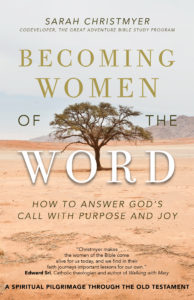 Becoming Women of the Word: How to Answer God’s Call with Purpose and Joy
Becoming Women of the Word: How to Answer God’s Call with Purpose and Joy
A spiritual pilgrimage through the Old Testament
Coming August 2, 2019
Available for pre-order now at Ave Maria Press, Amazon and Barnes and Noble
The post A MOTHER’S DAY GREETING FROM ST. PAUL appeared first on Come Into The Word with Sarah Christmyer | Bible Study | Lectio Divina | Journals | Retreat.
April 26, 2019
DON’T BE AFRAID: Jesus is with you!
One week after Easter, I can totally relate to the disciples. They are huddled behind locked doors, afraid of what the Jews might do to them. They must be still in shock from the crucifixion, even though they’ve been hearing that Jesus has risen. He’s not with them in the same way that he used to be. And if Jesus could be tortured and killed as a blasphemous rebel — are they, his followers, next? From inside that locked room, things must look pretty bleak.
Imagine how the disciples felt, when Jesus showed up in that room and stood among them!
Fear can be paralyzing. How often do we shut ourselves inside a “locked room” in our minds, shrinking from things that have hurt us, barricading our hearts from what might happen? This Sunday’s Gospel offers hope: Christ crucified and risen, not just knocking on the doors of our hearts but entering into the closed space where we are hiding.
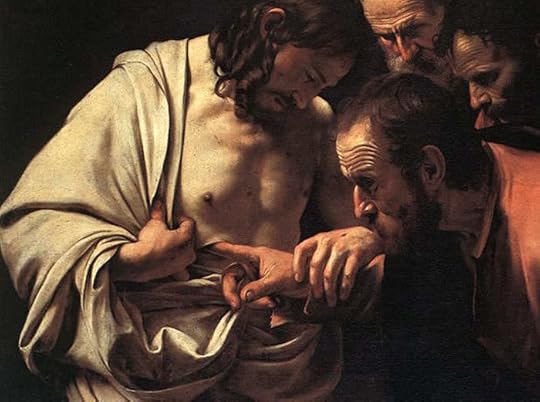
The Incredulity of St. Thomas, by Caravaggio (1601-1602). Wikimedia Commons.
“Peace be with you,” he says.
I absolutely love what comes next, as an antidote to fear. Not “Here I am – now grab your swords and help me fight back,” but “look at my hands and my side.” It’s like he was saying, Yes, they killed me. Yes, it was awful. But look at me now! Put your fingers in those nail marks! They’re real – but I AM ALIVE, better than ever in fact. PEACE be with you. There’s no need to be afraid.
Then Jesus breathed on them new life, the life of the Holy Spirit, and armed them for battle: not with fancy words or spears and swords but with forgiveness. “As the Father has sent me, so I send you,” he said. I went out forgiving, even to the Cross, and won not death, but life! Now you go — and do the same.
Our battles are real. At whatever level you’re facing the onslaught of the Enemy, whether it’s sickness or discouragement or the loss of a job or attacks on your faith or something else: open your heart to Christ, let Jesus in where you are hiding. And be not afraid!
In the words of St. Paul to the Romans,
“in all these things we conquer overwhelmingly through Him who loved us. For I am convinced that neither death, nor life, nor angels, nor principalities, nor present things, nor future things, nor powers, nor height, nor depth, nor any other creature will be able to separate us from the love of God in Christ Jesus our Lord” (Romans 8: 37-39)
Peace be with you on this day of Divine Mercy.
© 2019 Sarah Christmyer
Related posts:
Divine Mercy: What’s it to You?
God Calls Himself “Mercy”
Forgiveness: What it is and How to do it
Casting Out the Roots of Bitterness
A slightly different version of today’s post was published as “Be Not Afraid” on 4/27/2014 for the canonization of St. John Paul II.
The post DON’T BE AFRAID: Jesus is with you! appeared first on Come Into The Word with Sarah Christmyer | Bible Study | Lectio Divina | Journals | Retreat.
April 21, 2019
REFLECTING ON THE RESURRECTION: the Easter Octave
The sun is setting on another beautiful Easter Sunday. My phone and news feeds are full of Easter greetings. He is risen! The Lord is risen indeed! But at the back of my mind are the closing words of today’s gospel reading: “For they did not yet understand the Scripture that he had to rise from the dead” (see John 20:1-9).
As long as I’ve been a Christian, as long as I’ve believed that Jesus rose from the dead and sits at the right hand of God . . . I still find myself wondering, come Easter: do I really understand what that means? How can I enter into that more, and reflect on its meaning for me?
Thank goodness, the Church comes to the rescue. The whole week after Easter is officially part of the feast, and the season itself lasts for 50 days, all the way to Pentecost (that’s 10 days longer than Lent!). That gives plenty of time to reflect on this mystery, especially if we pay attention to the Scripture readings, which focus on the resurrection of Jesus and what it means for us who are resurrected to new life in him. The lessons are meant as instruction to the newly baptized, but we can glean a lot from them as well.
Consider extending your observance of Easter by meditating on the readings every day this coming week. Here are links to the readings and a preview of the way the disciples’ dawning comprehension of the resurrection (in the Gospels) is juxtaposed with its impact on their lives (in Acts):
Readings for Monday, April 22
Matthew 28:8-15: That Jesus was raised soul and body is learned by Mary Magdalene and the other Mary, who Jesus meets as they run to tell the disciples that he’s alive. They embrace his feet (impossible if he were just spirit) and take his message to the others — while the chief priests bribe soldiers to say his body was stolen.
Acts 2:14, 22-33: Peter tells the crowds on Pentecost that not only did God raise Jesus from the dead, it was all part of his plan to save. We are witnesses that he lives, he says, and they are witnesses of the Holy Spirit poured out on the disciples.
Readings for Tuesday, April 23
John 20:11-18: Mary Magdalene again; this time weeping at the tomb, so wrapped up in her grief, she doesn’t recognize angels or Jesus. But then he calls her by name. There’s relationship here, even though he tells her to stop holding onto him — that he’ll be ascending to the Father — and to go, tell the disciples.
Acts 2:36-41: Still preaching on Pentecost, Peter tells those who crucified Jesus that God made him Lord and Christ (Messiah). Repent therefore and be baptized and receive the Holy Spirit, he says; and “save yourselves from this corrupt generation.”
Readings for Wednesday, April 24
Luke 24:13-35: Jesus walks alongside two disciples heading out of town after his death. Their hearts “burn” while he explains how Scripture pointed to him and they recognize him when he gives thanks and breaks bread.
Acts 3:1-10: The power of Jesus begins to flow through the disciples as in the name of Jesus, Peter heals a man crippled from birth.
Readings for Thursday, April 25
Luke 24:35-48: Jesus appears among a group of disciples and they’re terrified, thinking he’s a ghost. He speaks peace to them, reassures them by letting them see and touch him and then by eating fish. He opens their minds to understand the Scriptures pointing to his passion and resurrection and mission and calls them to witness.
Acts 3:11-26: When people are amazed at his healing miracle, Peter attributes it to faith in the name of Jesus who God has raised from the dead. He calls them to repent that their sins be forgiven “and that the Lord may grant you times of refreshment and send you the Christ.”
Readings for Friday, April 26
John 21:1-14: The disciples don’t dare ask the risen Jesus if it’s really him when he leads them into a massive catch of fish after a night of catching nothing; they know it can be no one else.
Acts 4:1-12: Thousands of people come to believe through the disciples’ witness and the religious authorities arrest Peter and John. Previously timid Peter boldly proclaims that Jesus is “the stone rejected by you, the builders, which has become the cornerstone. There is no salvation through anyone else…”
Readings for Saturday, April 27
Mark 16:9-15: Mark explains that hearing from eyewitnesses was not enough to make the disciples believe at first; it was only later, when Jesus appeared to them together and rebuked them for their unbelief and told them to go and proclaim the gospel to the world.
Acts 4:13-21: The authorities are confounded by the boldness of Peter and John and their witness. When they threaten, Peter and John choose to obey God and not them. “It is impossible for us not to speak about what we have seen and heard.”
Readings for Sunday, April 28 (Divine Mercy Sunday and the close of the Octave of Easter)
John 20:19-31: Thomas refuses to believe until he sees and touches Jesus for himself. Yet even in doubt, he sought Jesus. “Blessed are those who have not seen and have believed,” Jesus said. John sums up his reason for writing: “that you may come to believe that Jesus is the Christ, the Son of God, and that through this belief you may have life in his name.”
Acts 5:12-16: The apostles do many signs and wonders and many come to believe. People from all around Jerusalem bring the sick and possessed to be healed “and they were all cured.”
Revelation 1:9-11a, 12-13, 17-19: John writes from exile to those who share in his distress “and the endurance we have in Jesus” of the vision he has of Jesus reigning in heaven.
Let us pray to the risen Christ, that he strengthen us in faith and embolden our witness!
May God bless you as you meditate on his Word.
© 2019 Sarah Christmyer
The post REFLECTING ON THE RESURRECTION: the Easter Octave appeared first on Come Into The Word with Sarah Christmyer | Bible Study | Lectio Divina | Journals | Retreat.
April 14, 2019
HERE COMES JESUS: Will you receive him?
In the mid-60s we were living in Hong Kong – my Dad was helping to start a missions hospital for refugees there. I was six. We heard that Princess Margaret and Lord Snowden were coming for a state visit, and we ran to the street to see them drive by. I couldn’t wait! From my story books, I knew exactly what a princess looked like: she would wear a sky-blue, glittery gown and a tall cone-hat with streamers. Her coach would be led by prancing horses . . . I was beside myself, waiting to see her.
To this day I remember the shock I felt when the royal couple drove into view. Margaret wore a plain brown dress and matching pillbox hat and gloves. She sat in the back of a plain black car and waved a little parade wave as she passed. She was ordinary, just like anybody’s mom! I felt sick. I didn’t know what to think. I just wanted to go home.
I wonder if this is how some of the Jews felt in Jerusalem, the week after Jesus’s triumphal entry? They couldn’t wait to welcome the messiah, and they knew just what he’d be like. When Jesus called for a colt as he approached the royal city, he was fulfilling the messianic prophecy of Zechariah 9:9. The people gave him a royal welcome, throwing down their cloaks like a red carpet and waving palm branches and shouting Hosanna! for joy.

Jesus enters Jerusalem and the crowds welcome him, by Pietro Lorenzetti, 1320 (Public domain)
Not a week later, Jesus continued on his way while people spat instead of waving palms and hurled insults instead of praise. And instead of hailing him as king, they called out, Crucify!
These people had not imagined a messiah who could be rejected by the religious leaders, brought up before Rome on trial and condemned to death. They could not see how through the cross he would deliver them from something worse than Rome and then rule forever from heaven. They didn’t recognize him, so they couldn’t receive him.

Titian, 1558 Ancona Crucifixion (Public domain)
Would we recognize him, if Jesus came today?
Because as much as we love him, it’s easy to dress Jesus up in our minds like I did with Princess Margaret, all those years ago. We want a knight on a white charger to sweep us off our feet. We struggle with broken families … addiction … unfair bosses … financial burdens … illness. We know he can heal, so we expect him to heal us of everything, now. We want him to be nice and forgiving to us and to judge everyone else. We want to put the cross behind us, rather than following him there; we don’t want to lift our own crosses and take them along.
We’re like Peter, who when Jesus said he would suffer and die, rebuked the Lord. No way! he said. That can’t happen. To which Jesus said, Get behind me, Satan. You’re holding me back.
At mass on Palm Sunday after we sing Hosanna! and wave our palms, the Liturgy of the Word will carry us into the Passion. And we will recite, out loud, the crowd’s part in the drama: with our own voices we will accuse Peter; we will jeer at Jesus on trial; we’ll reject him as Son of God, call for his crucifixion, and taunt him on the Cross. Just as so many others did, that long-ago day.
Read the Palm Sunday Mass Readings here
It is a good day to consider, as we head into Holy Week, just who it is we are welcoming into our hearts and lives. Are we ready to follow him to the cross, like the Beloved Disciple; like Mary and the women who loved him?
…it was to accomplish this mystery [of his Passion and Resurrection]
that he entered his own city of Jerusalem.
Therefore, with all faith and devotion,
let us commemorate the Lord’s entry into the city for our salvation,
following in his footsteps,
so that, being made by his grace partakers of the Cross,
we may have a share also in his Resurrection and in his life.
(invitation at the start of the Palm Sunday Procession)
May our Lord bless you and yours richly this Holy Week.
© 2019 Sarah Christmyer
The post HERE COMES JESUS: Will you receive him? appeared first on Come Into The Word with Sarah Christmyer | Bible Study | Lectio Divina | Journals | Retreat.
April 6, 2019
WHO DESERVES MERCY?
The man lies on a stretcher, desperately in need of medical attention. He’s not far from the door to the hospital, but no one will admit him. It’s a Union army hospital—and the man is a Confederate soldier.
A nurse tries in vain to get him help. Finally she cries out, fiercely, “Everyone deserves mercy!”
That dramatic scene was part of an ad for the PBS drama, “Mercy Street,” which explored the prejudices and loyalties of a group of real doctors and nurses during the Civil War. As I watched it, I found myself crying back: NO!
What is mercy?
I understood what she meant, and agreed that the man should be cared for. Yes, everyone should be shown mercy—whether they deserve it or not. But by definition, it is impossible to “deserve” mercy. When we get what we “deserve,” it’s called “justice.” You can demand justice. It’s your right. But mercy comes in when justice reaches its end. Mercy is given freely. Mercy is not owed; it’s an undeserved grace.
To people in many ancient cultures, the gods were bullies you had to placate and suck up to. When things went wrong, you could beg for mercy, but there was no guarantee of the response. But our God — the Christian God, the God of Israel — is not like that. He didn’t just bend down and show mercy when felt like it, he showed himself to BE mercy, in his essence. Mercy infuses and motivates everything God does. It’s his nature. No matter what, he is mercy.
Gospel Reading, 5th Sunday of Lent, Year C
That’s what makes this Sunday’s gospel (John 8:1-11) so important.
The scribes and Pharisees were experts in the law of Moses, but they were so caught up enforcing its minutia, they had shut their hearts to the love and mercy that animates it. When they dragged the woman caught in adultery into the temple, they were without mercy on two counts. They had no mercy on the woman, who they had judged guilty without remedy. And they were actively seeking a reason to charge Jesus, who they had judged guilty as well.
Jesus shows the true nature of God’s judgment and mercy.
He doesn’t engage their question (do we follow the law of Moses and stone this woman, or follow the law of Rome which doesn’t allow that?). He turns the question on them: whoever of you is without sin, throw the first stone. They saw themselves as righteous, “without sin;” but to throw a stone would endanger them with Rome. Yet to not throw a stone would be to admit they were sinners. Caught in their own trap, they walked away—leaving the woman alone with Jesus.
Jesus Shows God’s Mercy
The mercy that Jesus showed next is what Pope Benedict XVI defined in Deus caritas est as “love reaching pardon.” Jesus did not say that what she did was okay or try to make her feel better about it. But in love, he did not condemn her. He set aside justice in order to pardon. And in the process, he de-fanged those who did condemn.
Set gloriously free from a just sentence by which she might have lost her life, the woman was now free to “go and sin no more.” I wonder how her life changed, after that? Was she one of the women who, out of love, followed Jesus to the cross?
I also wonder whether any of the scribes or Pharisees or elders who left the scene that day, experienced changed lives as well. Imagine them later, every time they saw that woman in the street. I expect their first thought—There’s that hussy! She deserves to die!—would be followed by the words of Jesus. Would they think twice next time they went to judge? Or would they continue to harden their hearts and be among those who sent Jesus to the cross—not knowing that in going there willingly, he would pardon even that act?
Making Our Response
Our response to the Psalm this Sunday, from Psalm 126:3, is “The Lord has done great things for us; we are filled with joy.” Five times we will say it as the cantor proclaims the glory of God’s mercy. The Lord has restored us in the past, and will do so in the future. Can we claim that confidence for ourselves going forward? And will we remember it when we want to judge others?
“The Lord has done great things for us.” What great things has he done for you? Carry them into your prayer as you rejoice with the Responsorial Psalm. And if you are carrying a burden of sin, take it to the Cross—to our merciful God—and receive forgiveness and strength to change.
© 2019 Sarah Christmyer
“Let each one, therefore, who recites the Psalms have a sure hope that through them God will speedily give ear to those who are in need. … If he have sinned, when he uses them he will repent; if he have not sinned, he will find himself rejoicing that he is stretching out towards the things that are before [Phil 3:16] and, so wrestling, in the power of the Psalms he will prevail”
—St. Athanasius
The post WHO DESERVES MERCY? appeared first on Come Into The Word with Sarah Christmyer | Bible Study | Lectio Divina | Journals | Retreat.
March 17, 2019
THE LORD BRINGS LIGHT TO THE DARKNESS
Some situations just never get better. And I wonder: God—where are you??
We’re two weeks into Lent and the darkness is starting to settle in. I’m feeling the effects of self-denial and am not enjoying it. But worse is the longing for resolution to a long-standing problem. Lord—this is crushing me! I cry. Where is the end? I am trying so hard to love like you do, and forgive. When is it enough?
The Sunday readings speak into the darkness, shining a strengthening light.
Gn 15:5-12, 17-18 + Ps 27:1, 7-9, 13-14 + Phil 3:17 – 4:1 + Lk 9:28b-36
The gospel, like every 2nd Sunday of Lent, is the Transfiguration. This year (C), it’s from Luke. Surprisingly the first reading, which so easily could be about Moses or Elijah (who appear on the mountain with Jesus), is always from the life of Abraham. Why? The Transfiguration launches Jesus on a journey to glory that passes through suffering and the cross. Similarly, God’s promise to Abraham launched him on a journey that led through the sacrifice of his son. We are on a similar journey of faith—through Lent and through life)—to a promise that hangs in the future. To get there, we must take up a cross.
Knowing that doesn’t comfort, though. It makes me dread. So back to the readings:
1st Reading: Genesis 15:5-12, 17-18 (Read it here)
Genesis 15 is where Abraham looks to the stars and believes God’s improbable promise of countless descendants and a land to call their own (improbable because Abraham’s wife is barren and they are wandering nomads). It’s also the occasion when God swears absolutely that he will do it. To get to that point, God has asked Abraham to leave everything behind and follow him blindly, to trust in his good plan regardless of how anything might look.
No wonder the passage is filled with images of light and dark: stars that can’t be counted; a terrifying darkness; a smoking fire pot and a flaming torch. The stars represent the improbable hope. The terrifying darkness might be the state of Abraham’s mind. It’s the darkness that afflicts everyone at some time, that impotent state of not seeing the way to go forward. But it is into that darkness that God appears as a flaming torch to seal his promise. And so the Psalm . . .
Responsorial Psalm: Psalm 27:1, 7-9, 13-14 (Read it here)
“The Lord is my light and my salvation; whom should I fear?”
It’s not an accident that we proclaim that verse as our response. “I believe that I shall see the bounty of the Lord in the land of the living,” reads the last verse, as though referring back to Abraham who “sees” with the eyes of faith, illuminated only by the light God provides. “Wait for the Lord with courage,” the psalm continues; “be stouthearted, and wait for the Lord.”
Abraham waited his whole life and never saw God’s promise fulfilled. Somehow, fixing his sights on God’s promise enabled him to accept that he was an exile on earth and look to a heavenly future (read Hebrews 11:13-19). This possibility of standing firm while waiting on God, regardless of present darkness, is reflected in the 2nd reading:
2nd Reading: Philippians 3:17 – 4:1 (Read it here)
St. Paul speaks not of physical darkness and light but of the spiritual darkness of sin, which leads to death; and the light of following Jesus, which leads to heavenly glory. We can set our eyes on the enemies of Christ, do as they do and share their end; or we can look to Jesus and imitate those who follow him, set our sights on heaven and be transformed to be like him in glory.
Therefore, Paul concludes, “in this way stand firm in the Lord.” The Responsorial Psalm echoes in my mind:
“Wait for the Lord with courage; be stouthearted, and wait for the Lord.”
Gospel: Luke 9:28b-36 (Read it here)
Missing from the excerpt we hear from the gospel at mass is the beginning that gives us the context: “Now about eight days after these sayings,” Luke says, Jesus takes three disciples on a mountain to pray. In this way, he links the Transfiguration directly to the time Jesus told his disciples he would suffer, be killed and then raised. He also said anyone wanting to follow would have to take up his own cross first. Walking with the disciples in my mind, I’m thrown back into darkness. Is this what it means to follow Christ? In this situation that weighs on me: must I continue to offer myself? Where will it end?
I wonder if a similar fear clung to the disciples Jesus took to that mountain. Just like with the story of Abraham, it is into the darkness that God’s light appears: They are overcome by sleep—and the bright glory of the transfigured Christ pulls them out of it. Then they’re overshadowed by a cloud, and frightened—and into that darkness comes a voice: “This is my chosen Son; listen to him.”
He brings light in the darkness
“After these sayings,” Luke begins. After those words about dying and taking up one’s cross. Then “listen to him,” he ends. Listen to the one who will die, but who here is transfigured as a bright light before you. Take note: this is where the Passion leads! To glory. This is where your cross will lead too, if you listen to and follow the Light. You will be transformed to be like him.
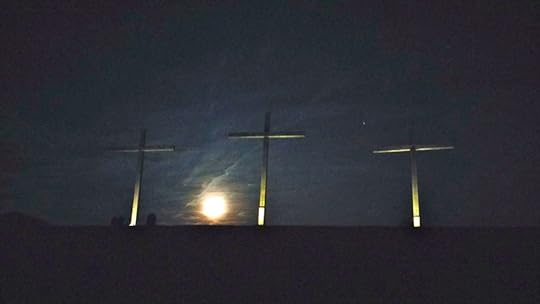
Moonrise behind empty crosses at Blackrock Retreat Center. He is risen! Photo by Sarah Christmyer.
We live in a fallen world that is dark, but God is there in the dark. The Lord is here with his light, bringing guidance and comfort and pointing the way to a promised and certain, glorious end.
I recall the Responsorial Psalm, take it into my week as I take up my cross:
“The Lord is my light and my salvation; whom should I fear? […] Wait for the Lord with courage; be stouthearted, and wait for the Lord.”
© 2019 Sarah Christmyer
A song comes to mind: “Great are you Lord,” by All Sons and Daughters:
You give life, You are love
You bring light to the darkness
You give hope, You restore
Every heart that is broken
Great are you Lord! . . .
This is part of a series of posts for Lent 2019 (Year C). Read the others here:
CREATE YOUR OWN DESERT FOR LENT and seek Christ in his Word
NOT BY BREAD ALONE: How to live by the word of God
The post THE LORD BRINGS LIGHT TO THE DARKNESS appeared first on Come Into The Word with Sarah Christmyer | Bible Study | Lectio Divina | Journals | Retreat.





